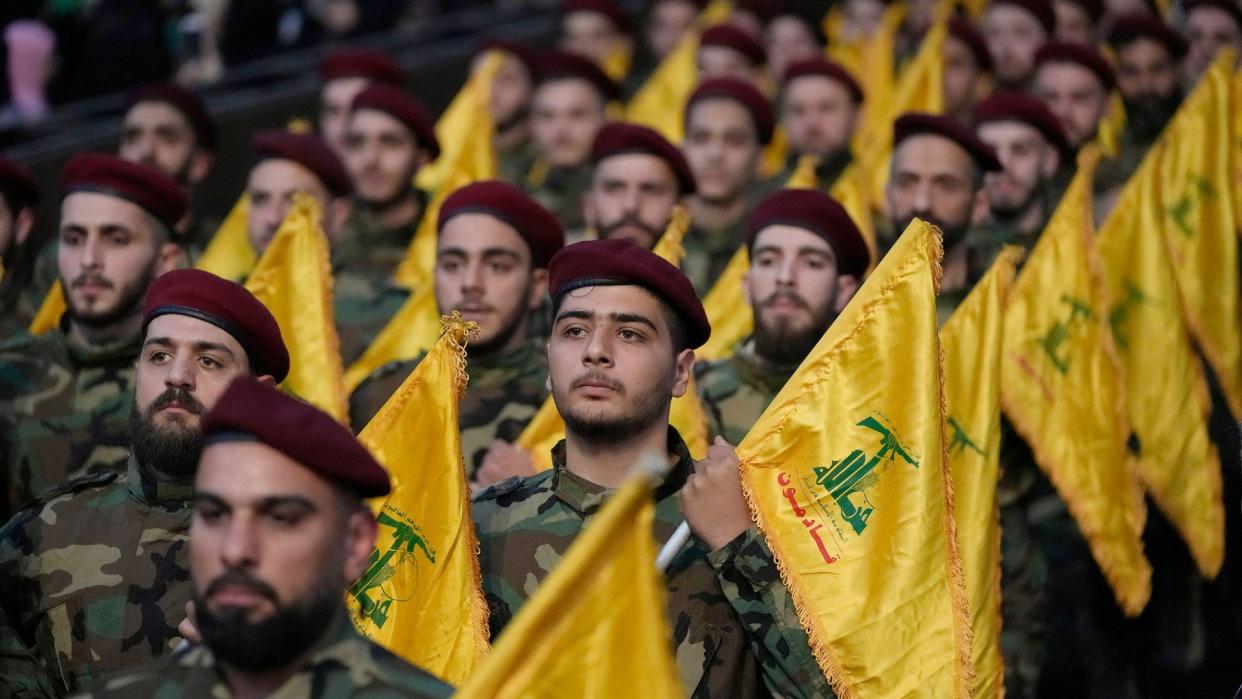A history of Hezbollah's tensions with Israel

- Oops!Something went wrong.Please try again later.
Israel's prime minister Benjamin Netanyahu has warned Hezbollah against making the "biggest mistake of their lives" by entering its war against Hamas.
The group, which wields significant power as a political party and militant group in Lebanon, has been exchanging artillery fire with Israel's military on their shared border since Hamas's deadly attacks on 7 October. This has escalated fears that an outbreak of hostilities between the long-standing enemies could spark a regional conflict that brings in Iran and even the US.
If Hezbollah decides to fully join the conflict "it will be nothing short of a game-changer", Firas Maksad, a senior fellow at the Middle East Institute in Washington, told CNBC. Compared to Hamas, Hezbollah is "a much more formidable fighting force and widely recognized as the most powerful nonstate military in the world", he added. Its involvement would have huge consequences "not only for Israel, but also for the entire region".
How did Hezbollah emerge?
Founded in 1982 by a group of radical Shia clerics in the midst of the Lebanese civil war (1975-1990), with backing from Iran’s Revolutionary Guard, Hezbollah, or the Party of God, has been blamed for "major and bloody acts of violence in Lebanon, against Israel and internationally too", said The Guardian.
While its original manifesto stated the group's goal was to expel the Christian-affiliated Lebanese Social Democratic Party, as well as Israel, France and the US, from Lebanon, Hezbollah's "main enemy" has long been Israel, said Kali Robinson for the Council on Foreign Relations.
Hezbollah was the only militia to keep its weapons at the end of the civil war in 1990, and it continued to fight Israeli forces occupying the country's predominantly Shia south, according to Reuters. Years of guerrilla warfare led Israel to eventually withdraw in 2000 but a full-blown war erupted in 2006 after Hezbollah crossed into Israel, kidnapping two soldiers and killing others. The resulting conflict lasted five weeks and claimed the lives of 1,200 people, mostly civilians, in Lebanon, and 158 Israelis, most of them soldiers.
Designated as a terrorist organisation by the US and UK, Hezbollah pioneered the use of mass casualty suicide attacks and is believed to be responsible for the 1994 bombings of a Jewish community centre in Argentina, which killed 85 people, and the Israeli Embassy in London. In 2012, a suicide bomb targeting a bus carrying Israeli tourists in Bulgaria killed six people, with the EU blaming Hezbollah.
How did it consolidate influence?
In the years since 2006, tensions between Hezbollah and Israel have remained "relatively dormant", said Al Jazeera, even as its political and paramilitary wings have grown in size and influence. The party marked its integration into mainstream politics in 2009 after amending its charter to be more open to democracy, and gained vital battlefield experience during the Syrian civil war, where it played a crucial role supporting the Assad regime. It has spent much of the last decade engaged in fighting in Iraq and Yemen.
With the backing of Iran, estimated by the US to run to hundreds of millions of dollars a year, Hezbollah is "a well-resourced armed group with a medium-sized force that can defeat most Arab armies", said Time. Analysts put the size of its fighting force between 50,000 and 100,000, making it "the most powerful non-state actor" in the region, Hilal Khashan, professor of political science at the American University of Beirut, told the magazine.
While there is no evidence of direct involvement in the Hamas attacks earlier this month, experts see the influence of Hezbollah. The attacks, said Matthew Levitt, from the Washington Institute for Near East Policy, were "straight out of the Hezbollah playbook".
What are the chances of war today?
With "more sophisticated weaponry, well-trained and battle-experienced troops, and closer ties to Iran", Hezbollah's military capabilities "far outweigh those of Hamas, making it a more dangerous opponent to Israel", said ABC News.
If Hezbollah's leaders, most likely taking direction from Tehran, decide in favour of escalating current hostilities, this "could lead to a bloody and difficult two-front conflict for Israel and so – potentially – to a regional conflagration as Syria, Iran, the US and other actors become involved", reported The Guardian.
Yet as Lebanon faces the worst economic crisis in its history, with triple-digit inflation and a currency that has lost more than 90% of its value since 2019, the group "doesn't have the domestic popular support it had in 2006 to support a military operation in Israel's current war with Hamas", said CNBC.
Some analysts believe that Hezbollah, though dedicated to the destruction of Israel, has "too much to lose to risk an all-out conflict, given its political and extensive commercial interests", said The Guardian. Instead, it is looking to provoke a "short, limited war" rather than a full-blown regional conflict.
With Netanyahu threatening to hit Hezbollah with "unimaginable force" that would mean "devastation for them and the state of Lebanon", a military move from the group would represent a huge gamble.

